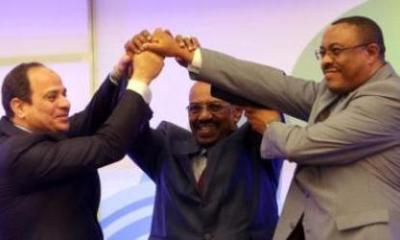Sudan, Egypt and Ethiopia agree to cooperate on Grand Renaissance Dam
January 29, 2018 (KHARTOUM) – Leaders of Sudan, Egypt and Ethiopia and Sudan have agreed to form a permanent committee to follow up on all issues of common concern particularly regarding the Grand Ethiopian Renaissance Dam (GERD).

“The three leaders have underscored keenness to sustain good relations among the governments and peoples of the three countries and they agreed to coordinate and work together for the common interest of the peoples of their countries,” said Sudan’s Foreign Minister Ibrahim Ghandour
Ghandour told reporters the tripartite meeting discussed relations among the three nations especially the issue of the GERD.
He said the three leaders agreed to discuss all mutual issues and to seek to achieve unity, pointing out that they agreed to establish a tripartite fund to support development projects and strengthen economic integration among the three countries.
Sudan’s top diplomat added the leaders also agreed to mandate the tripartite committee comprised of the irrigation ministers to serve as political committee and work to resolve all outstanding issues pertaining to the GERD and report to the leaders within one month.
He further said the meeting stressed the GERD is an Ethiopian dam that should benefit the three countries and that Sudan and Egypt water shares mustn’t be affected by its construction.
The leaders meeting comes amid heightened tensions in the region over border disputes, military alliances and the GERD.
In March 2015, the three leaders signed in Khartoum a framework cooperation deal on the GERD. They said the “declaration of principles” would pave the way for further diplomatic cooperation on the GERD which has stirred fears of a regional resource conflict.
However, since then the three countries failed to agree on the findings of the technical report related to the impact of the dam prepared by consultant companies, French firms BRL and Artelia.
The multi-billion dollar dam is being constructed on the Blue Nile, about 20 kilometres from the Sudanese border, and has a capacity of 74 billion cubic meters, and is expected to generate electrical power of up to 6,000 megawatts.
Egypt fears the dam will negatively affect its traditional share of water from the Nile, its only source of water which has been determined by a colonial-era water-sharing treaty.
But Ethiopia insists that this will not occur and asserts that the project is indispensable to its own national development and the economic welfare of its burgeoning population.
(ST)
